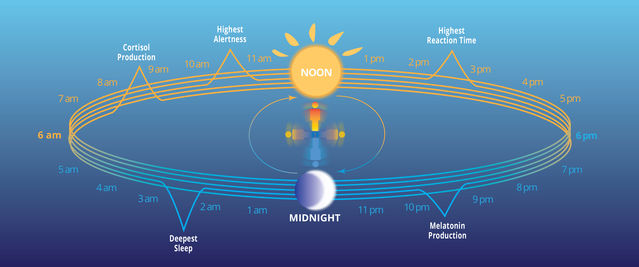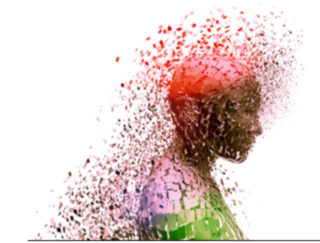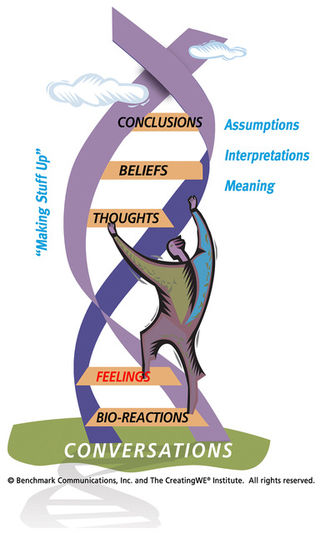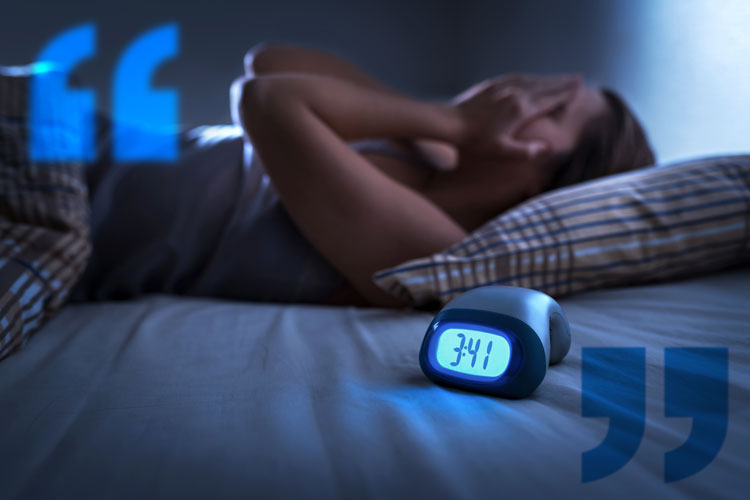By Nicklas Balboa and Richard D. Glaser, Ph.D.
Published in: Psychology Today
How stress and structure impact circadian rhythms.
Sleep is a natural state of rest where the body and mind can relax and recover from the day’s stress of work. Sleep is stimulated in humans by the pineal gland’s release of melatonin in response to the natural daily shift from light to dark. The common glial cell (astrocyte or the star cell) plays an integral role in sleep. Located in the suprachiasmatic nuclei of the hypothalamus, which is the body’s circadian pacemaker, astrocytes provide the necessary support and structure that allows synchronized cellular communication (Womac et al, 2009).
 Circadian RhythmSource: Roxanne Panero/CreatingWE
Circadian RhythmSource: Roxanne Panero/CreatingWE
Allostatic Load
 Allostatic LoadSource: Roxanne Panero(Shutterstock)/CreatingWE
Allostatic LoadSource: Roxanne Panero(Shutterstock)/CreatingWEThe disruption of sleep cycles can be linked to chronic exposure to stress. According to Bruce McEwen, a world expert on stress, sleep plays an important homeostatic role in organizing and regulating physiology and behavior. McEwen coined the term ‘Allostatic Load’ as the wear and tear on the body from chronic stress accumulated over one’s life experience (McEwen 2017). This Allostatic load can negatively impact your sleep if the amount of stress becomes chronic, intolerable, or toxic.
Modern stress is very different from the stress our ancestors experienced. For example, modern stress is concerned with bills, work, or long-term social relationships. Because this type of stress is prolonged, it has the potential to become the foundation from which negative health effects begin.
Some of the potential short-term effects of sleep loss are irritability, lack of focus, hallucinations, lowered mood, memory dysfunction and increased perception of pain. Chronic sleep conditions like insomnia can be attributed to fluctuated neuro-endocrine activity in the HPA (hypothalamic pituitary adrenal) axis, which stimulates the body’s stress response and the release of the hormone cortisol (Basta et al, 2007). The average person produces high amounts of cortisol during the day, then production peters off at night in order to properly rest the body. However, if the Allostatic Load is intolerable, the individual will continue to produce cortisol during sleep, which can prevent our hippocampus from generating new cells (McEwen 2017).
This overexposure to cortisol can leave someone at risk for the development of chronic diseases like diabetes, obesity, depression, and other inflammatory diseases (McEwen 2015). Modern studies also suggest that sleep deprivation and disrupted circadian rhythms, or the body’s natural rhythms, can also negatively impact mental health (Harvard Health 2009).
By degrading physical systems in this way, stress negatively impacts the body’s ability to function as well as the mind’s ability to process information, which directly impacts emotional states. Severe stress can inhibit and impair the functionality of the prefrontal cortex, which is a major contributor in planning, working memory, and inhibiting risky impulsive behavior.
Nature and Nurture
Epigenetics is a trending and powerful area of genetic research. Epigenetics refers to mechanisms that alter gene expression in a heritable manner without affecting the underlying genomic sequences and that influence gene transcription over time (McEwen 2012). Perhaps modern environmental factors such as stress, diet, exposure to pollution, and socioeconomic status can influence epigenetic responses that negatively impact sleep. McEwen double-clicks on these points in a recent interview, identifying that factors like early child-hood trauma, pollution, and a lack of exposure to green nature can negatively affect the body’s ability to regulate circadian rhythms (Glaser & McEwen 2018).
Physical exercise is the number one factor standing between you and good health. Daily walking can increase grey matter in the brain, lower the allostatic load, and promote neurogenesis, the brain’s ability to produce new neurons (McEwen 2015). Interestingly enough, astrocytes also play a role in cell healing and neurogenesis in the hippocampus (Richetin 2018). For the types of stress that arise from rumination and other cognitive origins, practicing meditation and compassion in our daily lives can prime us for healthier conversations, which in turn can help prevent stress.
 How can Conversational Intelligence® Help Regulate Stress?
How can Conversational Intelligence® Help Regulate Stress?What is the impact of stress on our ability to feel healthy and perform successfully? Stress has a huge impact on closing down the brain’s capacity to process higher-level thoughts and work with others co-creatively. By understanding what creates stress and anxiety, we can begin to learn how to down-regulate and up-regulate our emotions and shape our conversations in ways that elevate health and conversational mastery. Our perception of reality influences our levels of stress and how we see reality is unique to each of us. In order to understand stressors, we need to change our perceptions of stress. When we have a stress reaction to something we agitate our levels of stress by creating ‘interpretations of a situation’ that suggest we are less able to handle that stress, and we often go up the Ladder of Conclusions and ‘make stuff up’ in ways that agitate our nervous system.
Mindfulness, or consciousness of our internal and external environment at the moment, teaches us how to recognize the stimuli, or stressors, in our environment that cause anxiety and chronic stress. Mindfulness methods may help increase our awareness of our body and its current feelings – it is the sense responsible for detecting and regulating our regulatory responses such as heartbeat and breathing (interoception). Most people don’t pay attention to these functions. We can learn to have an influence on our nervous system, our interpretations and even our perceptions. When we do this we gain mastery over our own nervous system and the impact it has on our well-being.
You make me Glial
Another fun fact about glial cells, astrocytes in particular, is that the late Albert Einstein had a more than average amount of them in his brain. In an early attempt to discover the secrets of Einstein’s genius, Princeton pathologist Thomas Harvey had a sample of Einstein’s brain analyzed. He discovered that there was a higher count of glial cells in relation to the number of neurons in Einstein’s inferior parietal lobe, an area of the neocortex associated with the multi-modal perception of language, mathematics, and emotional facial micro-expressions (Hamilton 2010). Perhaps the rare occurring abilities of genius are catalyzed by certain atypical structures in the brain, allowing complex associative forms of thought that shift paradigms of thought.
References
Womac, A. D., Burkeen, J. F., Neuendorff, N., Earnest, D. J., & Zoran, M. J. (2009, September). Circadian rhythms of extracellular ATP accumulation in suprachiasmatic nucleus cells and cultured astrocytes. Retrieved from https://www.ncbi.nlm.nih.gov/pmc/articles/PMC2757148/
McEwen et al 2015, Sleep Deprivation and Circadian Disruption: Stress, Allostasis, and Allostatic Load. Retrieved from
https://www.ncbi.nlm.nih.gov/pubmed/26055668
McEwen, B. S. (2017). Neurobiological and Systemic Effects of Chronic Stress - Bruce S. McEwen, 2017. Retrieved from https://journals.sagepub.com/doi/full/10.1177/2470547017692328
Basta, M., Chrousos, G. P., Vela-Bueno, A., & Vgontzas, A. N. (2007, June). CHRONIC INSOMNIA AND STRESS SYSTEM. Retrieved from https://www.ncbi.nlm.nih.gov/pmc/articles/PMC2128619/
Glaser, J. E., & McEwen, B. (2018, April 25). Bruce McEwen WE-IQ TV Interview. Retrieved from https://vimeo.com/279129730/51778834fb
McEwen, B. S., Eiland, L., Hunter, R. G., & Miller, M. M. (2012, January). Stress and anxiety: Structural plasticity and epigenetic regulation as a consequence of stress. Retrieved from https://www.ncbi.nlm.nih.gov/pmc/articles/PMC3196296/
Harvard Health Publishing. (2009). Sleep and mental health. Retrieved from https://www.health.harvard.edu/newsletter_article/sleep-and-mental-health
Casse, F., Richetin, K., & Nicolas, T. (2018, October 31). Astrocytes' Contribution to Adult Neurogenesis in Physiology and Alzheimer's Disease. Retrieved from https://www.frontiersin.org/articles/10.3389/fncel.2018.00432/full
Hamilton, J. (2010, June 02). Einstein's Brain Unlocks Some Mysteries Of The Mind. Retrieved from https://www.npr.org/templates/story/story.php?storyId=126229305









